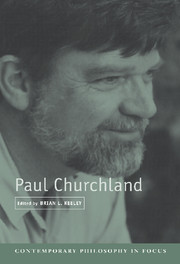Book contents
- Frontmatter
- Contents
- Preface
- Acknowledgments
- List of Contributors
- 1 Introduction: Becoming Paul M. Churchland (1942–)
- 2 Arguing For Eliminativism
- 3 The Introspectibility of Brain States as Such
- 4 Empiricism and State Space Semantics
- 5 Churchland on Connectionism
- 6 Reduction as Cognitive Strategy
- 7 The Unexpected Realist
- 8 Two Steps Closer on Consciousness
- Index
- References
4 - Empiricism and State Space Semantics
Published online by Cambridge University Press: 05 June 2012
- Frontmatter
- Contents
- Preface
- Acknowledgments
- List of Contributors
- 1 Introduction: Becoming Paul M. Churchland (1942–)
- 2 Arguing For Eliminativism
- 3 The Introspectibility of Brain States as Such
- 4 Empiricism and State Space Semantics
- 5 Churchland on Connectionism
- 6 Reduction as Cognitive Strategy
- 7 The Unexpected Realist
- 8 Two Steps Closer on Consciousness
- Index
- References
Summary
For some time now, Paul Churchland has been defending a connectionist theory of mental content, alliteratively labeled state-space semantics. The theory is at once holistic, prototype-based, and neurally reductionist. If you mix those ideas into a single theory, one thing is guaranteed: you will hear from Jerry Fodor and Earnest Lepore. The exchange between Churchland and the Rutgers duo has spanned several papers, and several voices have been chiming in from the sidelines. Both sides have claimed victory, but these declarations are premature. I think Churchland has been successful in addressing some of the objections levied by Fodor and Lepore, but others remain. Fodor and Lepore recognize that there may be a way out for Churchland. He could overcome some of their more pressing concerns if he embraced an extreme form of concept empiricism. In pointing this out, they intend to highlight the fatality of their objections. Empiricist theories of concepts are unacceptable on other grounds. No one, not even Paul Churchland, wants to resurrect Hume. If empiricism is the only way to navigate state space, it's time to give up on that program and set course for another semantic theory. This is a rare point of agreement between Churchland and his critics.
I will argue that empiricism isn't as unworkable as it appears. If I am right, then state-space semantics may be able to withstand the objections of Fodor and Lepore. But that does not mean Churchland wins the debate. Empiricism raises further concerns about state-space semantics.
- Type
- Chapter
- Information
- Paul Churchland , pp. 88 - 112Publisher: Cambridge University PressPrint publication year: 2005



